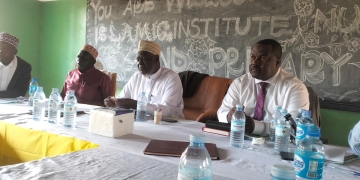 Mbale, Uganda – October 20, 2024– President Yoweri Kaguta Museveni today called on local leaders in Uganda, particularly those in the Bukedi sub-region, to play a more active role in overseeing and monitoring government programs, including the Parish Development Model (PDM).
Mbale, Uganda – October 20, 2024– President Yoweri Kaguta Museveni today called on local leaders in Uganda, particularly those in the Bukedi sub-region, to play a more active role in overseeing and monitoring government programs, including the Parish Development Model (PDM).
During a press briefing with journalists from the Bukedi region, held at the Mbale State Lodge in Mbale City, President Museveni stressed the critical importance of grassroots accountability and urged local leaders to ensure that government funds are used effectively and transparently. The President is currently on a performance assessment tour of the PDM in the Bukedi sub-region, where he has been evaluating the implementation and impact of the program.
The Role of Local Leaders in Oversight
The President reminded the public that Local Council (LC) leaders are elected to serve the interests of the people and to ensure that public resources are properly managed. He emphasized that the effectiveness of the PDM, which aims to uplift communities economically by providing financial support to the most marginalized, hinges on the vigilance and commitment of local leaders to monitor its implementation.
“Local leaders, especially LC3 and LC5 chairpersons, must take active roles in protecting government funds. Their duty is to ensure that the money allocated to communities is used for the benefit of the people, not for personal gain,” President Museveni said.
He also addressed growing concerns over reports of misappropriation of PDM funds, urging communities to elect leaders who prioritize accountability and integrity. The President noted that the National Resistance Movement (NRM) government had established the LC system to empower communities to elect representatives who are more attuned to local needs, in contrast to a reliance on public service officials who may lack local accountability.
Addressing Environmental Challenges and Wetland Encroachment
President Museveni also tackled environmental issues, particularly the encroachment on wetlands in the Bukedi sub-region. He acknowledged that some local farmers, misled by prior government policies, had turned to farming in wetlands, causing significant environmental damage.

To address this, the President announced a government compensation plan for those affected by wetland encroachment. He added that resettled residents would be encouraged to switch from rice farming to fish farming, a more sustainable practice that preserves wetland ecosystems while offering economic benefits through water irrigation systems.
“We are committed to restoring our wetlands while ensuring that the people who depend on them for their livelihoods are not left behind,” he said, expressing confidence that this approach would benefit both the environment and local economies.
Strengthening Relations with Cultural Institutions
President Museveni also addressed the relationship between government and cultural institutions, urging cultural leaders to respect their boundaries and avoid interfering in government affairs. He cautioned that such interference could lead to unnecessary conflicts between the state and traditional leadership.
Future Outlook for the PDM
Looking ahead, President Museveni reaffirmed his commitment to further funding the PDM as Uganda’s tax revenue grows. He emphasized that the increased funding would provide more economic opportunities for communities across the country, helping to lift people out of poverty and strengthen local economies.
The President also highlighted the positive impact of the PDM, noting several success stories among beneficiaries of the program. He called on the media to give more attention to these successes, so that other communities could learn from their peers and be inspired to take full advantage of the program’s benefits.
“Increasing media coverage of these success stories will help other communities see the potential of the PDM and encourage them to engage fully with the program,” he concluded.
President Museveni’s remarks come at a time when the government is seeking to boost transparency, accountability, and economic development at the local level, with the ultimate goal of achieving lasting prosperity for all Ugandans.










